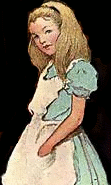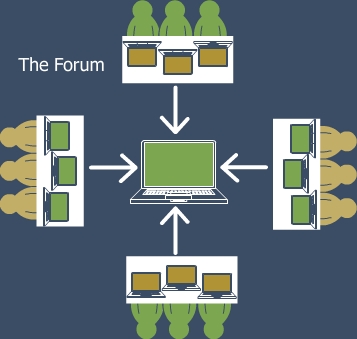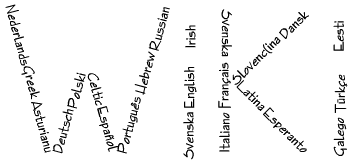Through the Looking Monitor: Alice in Wikiland
 Wikis and the Rhetorical Community
Wikis and the Rhetorical Community
Wikis shape this rhetorical community in important ways. Questions surrounding the rhetoric of discourse community, knowledge-construction, and audience are important topics for research if the implementation of wikis into composition classrooms is to be successful and meaningful for our students. Community is defined here as a group of people who share common interests, goals, and concerns with one another. A wiki community as a discourse community adheres to many rhetorical principles that are driven by these motivations (interests, goals, and concerns); however, it admits considerable flexibility because of its changing and potentially broadening numbers.
Herrick (2001) defines a community of discourse as one “[t]hat enable[s] people to think and act with unity to address a wide range of serious social problems" (p. 23). He goes on to explain that this community may operate very effectively without its members being familiar with each other. Wikis provide a space for the community to sustain communication "by the rhetorical interactions of their members," members that may not be familiar with each other, and this is crucial to the rhetorical discourse community" (p. 23). Often, the members of a wiki community are not familiar with each other due to the network the wiki creates, being an online forum. In Alice's case, her wiki community will be familiar with each other since they also share a physical space in which the class meets weekly. Alice and her classmates must negotiate several spaces in order to be fluent in their classroom written discourse. These spaces are both physical and digital and what makes them coherent is the community around which they are constructed.
Thomas Farrell (1991), in "Practicing the Arts of Rhetoric: Tradition and Invention," recognizes the fluidity of the community model. He claims that the extremes of context represent the mythical and the constitutive conditions for a community. The middle ground for Farrell, which mirrors the ideas he borrowed from G. Thomas Goodnight's notion of the public sphere, is the rhetorical forum. The forum is "any encounter setting sufficiently durable to serve as a recurring "gathering place" for discourse" which "provides a space for multiple expressed positions to encounter one another" (p. 88). Farrell also notes that the forum allows for various modalities that grant "a hearing" to differing "positions."
And, in its most developed condition, the forum may also provide precedents and modalities for granting a hearing to positions, as well as sorting among their agendas and constituencies. This is a way of saying that a rhetorical forum provides a potential normative horizon, an avenue of mediation among discourses that might otherwise be self-confirming, incommensurable or perhaps not even heard at all . . . It is the rhetorical forum which allows the plurality of appearances to be presented, witnessed and regarded, qualified and subverted by the perspectives of others. (p. 89)
The wiki provides a type of this forum for the community by enabling multiple perspectives to be weighed, considered, and altered if needed. The wiki community constructs a place"where the normative "content' and convictions of membership groups may be identified and expressed" (p. 88). As Farrell notes, this setting may be"formal, informal, even conjectural and socially emergent," thus providing a"plurality of appearances" (p. 89-89).

Figure 1.4: The Forum
In Alice's classroom, the wiki setting is semi-formal due to its educational context. The wiki allows each student a hearing, or a position, and a space in which to voice that position as assignments dictate and decorum guides. Since all students can add to, delete, or revise their own (and others) text/visuals/audio, the wiki enables the forum by structuring knowledge building in an environment that allows for testing ideas through community involvement (direct involvement in this case). One important implication of applying Farrell's conception of forum to the wiki space is that the "conscious awareness of [audience members'] presence in the symbolic landscape of prospective thought and decision" means that the "other persons and constituencies make a difference and thus must be "taken into account" in our deliberations" (p. 89). In other words, web 2.0 technologies such as the wiki give voice to multiple constituencies (whether traditionally silenced or empowered). The virtue of "conscious awareness" of the wiki community guides how knowledge is constructed as well as what constraints that knowledge is brought into consensus.
John Trimbur (1989) is perhaps one of the strongest supporters of a re-consideration of consensus in the rhetorical space. Wiki communities may lend themselves to a limited consensus, in part due to the common topoi shared by community members, but that consensus is one of difference (and diversity) as defined by Trimbur in "Consensus and Difference in Collaborative Learning." Trimbur notes that traditionally, the "aim of collaborative learning," a concept that is key to wiki audience, "is to reach consensus through expanding conversation" (p. 602). Barton and Cummings (2008) contend that wikis change writing because they "structurally invite collaboration and yet tolerate dissention” and even if “wikis do not foster complete consensus, they facilitate a defined disagreement” (p. vii).
Furthermore, Trimbur remarks that critical scholarship has argued that "the use of consensus in collaborative learning is an inherently dangerous and potentially totalitarian practice that stifles individual voice and creativity, suppresses differences, and enforces conformity" (p. 602). A second criticism of the consensus enabled by community collaboration, such as that which takes place in a wiki, is that it runs the risk of "limiting its focus on the internal workings of discourse communities and of overlooking the wider social forces that structure the production of knowledge" (p. 603).
What Trimbur, and other scholars following his work have argued, is that consensus, instead of limiting outlook, actually generates "differences, to identify the systems of authority that organize these differences, and to transform the relations of power that determine who may speak and what counts as a meaningful statement" (p. 603). Trimbur's argument revolves around the idea that the "social agency inherent in group life" empowers the individuals within a collaborative community, instead of stifling that individuality as some critics claim. Indeed, as Barton and Cummings (2008) argue, “it is the underlying commonality of that shared space, the wiki itself, that moves users from complete divergence of opinion toward often greater understanding through dialogue” (p. vii).
Important here is the notion of abnormal discourse that Trimbur elicits. Trimbur builds upon Rorty's conception of abnormal discourse by taking it out of romantic and pragmatic realms and posits it as referring to "the relations of power that determine what falls within the current consensus and what is assigned the status of dissent" which enables abnormal discourse to "analyze the strategic moves by which discourse communities legitimize their own conversation by marginalizing others" (p. 608-09). Building also on Bakhtin, Trimbur believes the conversation, and this will be applied to the wiki environment, is "heteroglot," or a multifaceted mosaic of vernaculars that express the differences inherent in the audience members of a collaborative community.

Figure 1.5: Mosaic of Vernaculars
Essentially, this consensus through difference is important for understanding how wiki communities lend themselves to a NPOV (see Wikipedia NPOV policy). The differences that the communities encourage have democratic voice in how the knowledge of the community is structured. Alice and her classmates each have a potentially equal voice in the classroom and each group member a potentially equal position in the group narrative. These multiple voices in the wiki community contribute to and encompass the changing discourse of the community, which is in turn constructed around a shared knowledge base.